Dear Classical Wisdom Reader,
We have little more than fragments of her work left.
Yet her poetic reputation remains immensely strong.
Sappho was considered to be the greatest poetess of ancient Greece, garnering praise from the likes of Aristotle and Plato. The ancient Greeks considered her the equal of Homer, and even gave her the title of “The Poetess.”
Over the years, of course, much of her work has sadly been lost. Yet that only makes it more important to keep the flame alive for the future.
Inspire the next generation with Classical Wisdom’s children’s book Sappho: The Lost Poetess by our own Anya Leonard.
A beautifully illustrated hardback, it tells the story of a young Sappho and a poem she wrote about her brothers heading off to war. This was a poem that was believed to be lost… until a surprising discovery was found!
Featuring lines of Sappho’s actual poetry, as well as a historical appendix for those who want to find out more, this is sure to spark an interest in archaeology, poetry, and all things ancient.
You can find that, alongside many other Classics-themed gifts, at our shop ClassicalWisdomBooks.com
After all, one of the most important things about studying the past is preserving it for the future.
All the best,
Sean Kelly
Managing Editor
Classical Wisdom
Sappho: Ancient Greece’s Greatest Female Poet
By Nicole Saldarriaga
“Prosperity that
the golden Muses
gave me was no
delusion: dead, I
won’t be forgotten”
The author of these words could not have issued a better prediction. This figure of classical antiquity was regarded by contemporaries with nothing but esteem, admiration, and sometimes infatuation. With a likeness that appeared on coins, a firm place in the Library of Alexandria’s canon of nine lyric geniuses, and the intense respect of people like Plato and Aristotle, there’s no question that this poet was one of the most famous and beloved of the classical era—and, believe it or not, she was a woman. She was a daughter, sister, mother, lover, poet and musician—and, true to her expectations, the world has still not forgotten her name: Sappho of Lesbos.
Sadly, despite Sappho’s continued relevance and fame, very few of her poems and none of her songs have survived the harshness of time. What we do have is a collection of fragments—some of them numbering only one word—but these fragments have been studied, translated, and published again and again throughout the years, proving that society’s fascination with Sappho’s work didn’t die with her or her contemporaries. What is perhaps more surprising (and in many ways, disappointing) is the whirlwind of furious debates and controversies that surrounds her life, about which we know extremely little.
Thanks to a few other writers of classical antiquity who specifically name historical figures as contemporaries of Sappho, we can overlap and piece together the dates and time periods we do know to infer that Sappho was born around 615 BCE. We know for certain (thanks to her customary title and her own poetry) that she was born on the island of Lesbos (located in the northeastern Aegean Sea near the coast of Asia Minor), though we are not sure if her birthplace was the capital city of Mytilene or in the smaller town of Eresus; and scholars are also fairly certain that as an adult she oversaw some kind of academy for young women in Mytilene. Evidence (including, again, her own poetry) suggests that she was born into an aristocratic family and eventually had a daughter named Cleis (most likely with Cercylas, a wealthy man she was thought to have married, though the evidence for his existence is much less verifiable).
Of course, it would be silly to ignore the biographical fact for which Sappho is most well-known, and the one that sparks the most controversy: her sexuality.
Generally, Sappho is considered one of the most famous lesbian poets in history: so much so that the very word “lesbian” is derived from “Lesbos,” the island of her birth. Despite a long line of Victorian scholars and translators who tried their best to “tone down” Sappho’s poems so that readers wouldn’t “get the wrong impression,” there is no denying that her poetry (so much of which is about love and desire) gives equal romantic attention to men and women (though some readers, including myself, would argue that her love poems to women have a fiercer desire and a more beautiful light in them than her poems about men).
In an era such as ours, it seems reductive and close-minded to argue about Sappho’s sexuality instead of accepting the raw beauty of her poems, which clearly catapulted her to fame in her own time (note that no one seems to have raised an eyebrow about her sexuality then—societal norms were very different in ancient Greece, where bisexual behavior was considered par for the course).
However, it’s definitely worth noting that her poems alone didn’t lead to this conclusion about her romantic preferences. About three centuries after her death, Greek comedians began to parody Sappho, portraying her as oversexed, promiscuous—practically a prostitute. This image, sadly—despite how loved and revered she was in her own time—is the one that eventually stuck; and this reputation paired with her love poems to women eventually put Sappho on such bad terms with the emerging Catholic Church that much of her surviving work was utterly destroyed by church-sanctioned book burnings around 1073.
Her sexuality and personal life are still debated to this day (though perhaps with fewer fiery consequences)—but it would perhaps be more constructive to avoid trying to prove any one point right now, and to instead focus on what we do know for certain about Sappho: her work and its immense popularity.
Sappho is one of very few women poets that we know about from classical antiquity, and she is certainly the most well respected. Critics, both in her own time and ours, firmly dub her one of the greatest lyrics poets to have ever lived, and a lyric genius.
Her poems, like her songs, were meant to be sung, usually with the accompaniment of a lyre—and, in fact, she’s credited with having invented a musical mode, the plectrum (now popularly called a “pick,” as in a guitar pick) , and even a specific kind of lyre. She’s also largely credited with inventing a particular kind of poetic meter which is now called “Sapphic meter.” This technique utilizes stanzas (also called “Sapphic stanzas”) that are characterized by three long lines followed by a fourth short line.
By the time Sappho’s poems were first transcribed together into one collection around the 3rd Century BCE, they filled nine volumes which, all told, would have amounted to something like 10,000 lines of poetry. But it wasn’t her prolificacy that made her so popular. Unlike many of the poets of her day, Sappho didn’t choose to write about the gods or the epic heroes. Instead her poems deal with the feelings of one individual speaker, tracing her feelings about time, family, and especially love. The verses are achingly simple and direct, with no “flowery” language to cover up the raw descriptions of love, desire, and the bittersweet pain that sometimes comes hand-in-hand with those feelings (incidentally, the term “bittersweet” and the notion that love can feel this way appeared for the first time in Western Literature in one of Sappho’s poems).
Something about the honesty of Sappho’s work (and probably her music) deeply moved those who encountered it. The literary critics of antiquity who wrote about Sappho nearly always wrote about her work under the obvious assumption that everyone must love her—it’s almost a “who wouldn’t?” attitude that pervades nearly all the critiques we still have. Plato himself called Sappho the “tenth Muse.” She was the only woman to be included in the canon of nine lyric geniuses—a list decided upon by the famed scholars at the Library of Alexandria. Even Aristotle, in his Rhetoric, wrote that Sappho “was honored although she was a woman.” And (what is perhaps most telling) Greek society seemed to consider Sappho on par with Homer—while he was reverently called “The Poet,” she was called “The Poetess.”
Keep the Classics Alive! Become a Member and gain access to our archives of exclusive podcasts, in-depth articles, magazines, e-books and more.
Fragments of Sappho’s poetry are still being found on tattered pieces of papyrus that were used in an ancient coffin-making process similar to papier mâché.
Thankfully, not all of her work was destroyed by book burnings or time. We have a decently sized collection of fragments, one full poem (of about twenty-eight lines), and, miraculously, fragments are still being found (one was discovered–or, more accurately, recognized as Sappho’s work–as recently as 2012)–most of them on tattered pieces of papyrus unearthed in Egypt.
One thing is absolutely clear: Sappho was correct in thinking that she’d never be forgotten. Society’s memory of her can get bogged down by debates about her sexuality or personal life, but the sheer number of existing translations and studies of her work are testaments to the fact that her words still have the power to delight and move us. We can appreciate her not only as a poet, but also as something of a feminist icon–a woman who, against the odds and the norms of her society, attained incredible fame. She certainly wasn’t lying when she wrote:
“Although they are
Only breath, words
which I command
are immortal”





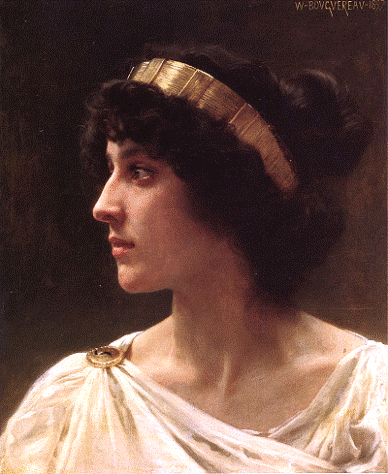
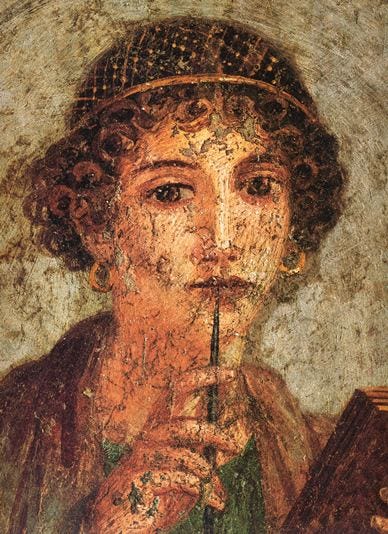
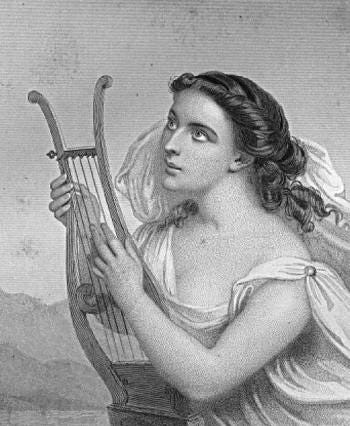
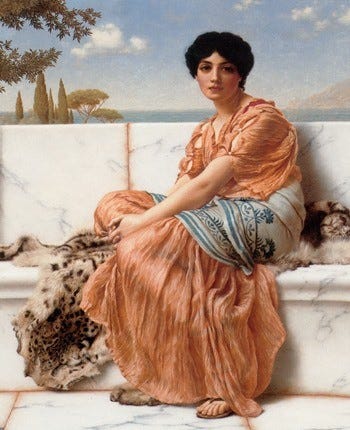
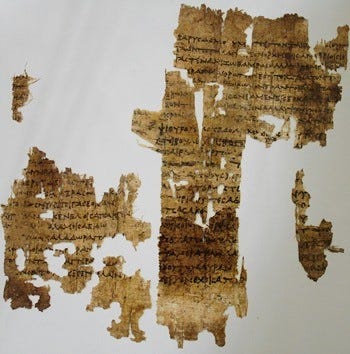
This was a truly pleasure to read, I loved the poetry “Although they are only breath, words which I commend are immortal.” After reading this, my interest in her poetry has grown! Thank you for shedding light on her.
I own a book published in 1972 called "Sappho Was A Right On Woman". I highly recommend it. Great read!